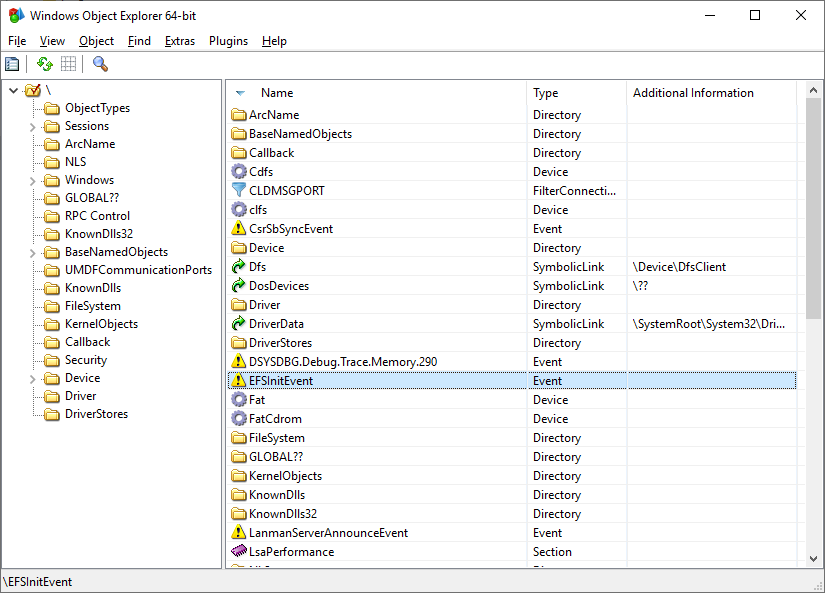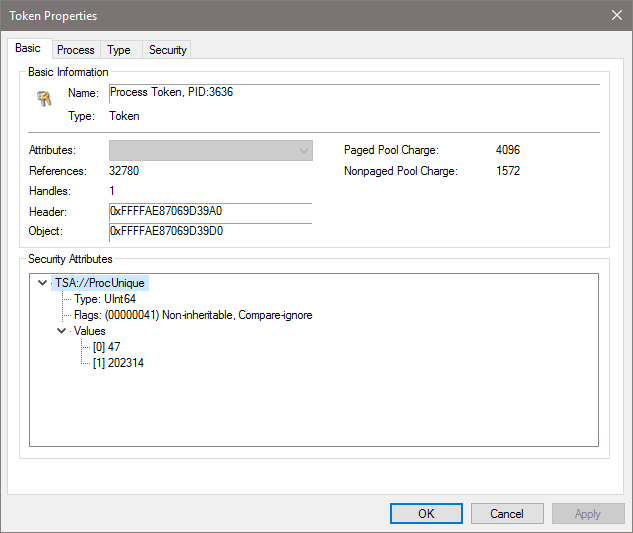Lets start with current 1.8.2 release.
Pic 1. WinObjEx64 main window
This version mostly focusing on fixing various incompatibility issues and bugs found during usage/tests as well as providing additional support for newest Windows 10 20H1.
Lets start with fixes.
The first important fix is for High DPI use case where several dialogs (presumable Object page, UserSharedData and ApiSetSchema main window) were affected with GUI artifacts during running with non default system DPI values. There personally I don't have enough usage data to fix this earlier as at least Object/UserSharedData dialogs were affected for a long time.
Another fix is for Pipe dialog, where Security page was mistakenly disabled even when security information was available for selected pipe. This regression was added in one of the previous releases.
Lots of work related to making WinObjEx64 run on Wine/Wine-Staging. The main problem with Wine was always how it interprets internals of Windows Native API. Without proper workarounds it is impossible to run WinObjEx64 on Wine. For example one of first problems with Wine in the past was how Wine defines NtQueryDirectoryObject behavior - in a completely different way than it is on Windows. It required input buffer not to be NULL and does not return required buffer size. Another big glitch was related to how it align several system information structures in memory with layout identical for both x86-32 and x64.
This time the following Wine/Wine-Staging incompatibles/bugs were fixed:
- Wine has no themes support from the box. Maybe they somehow can be enabled, IDK and honestly don't care, but from the box it doesn't have them. No support in Wine-Staging too. WinObjEx64 uses custom control named TreeList which is a combination of header and treeview controls. With no themes support there was no glyphs (opened/closed) used for parent node identification. So now they are drawn manually in case if theme support is not available.
- Wine-Staging includes special hack "hide Wine exports from applications" which does exactly what is called. This is done for applications that a deliberately attempt to detect Wine presence (and probably won't allow execution on it). Internally this is implemented as patch for LdrGetProcedureAddress of Wine ntdll.dll, they check requested routine name against small blacklist, implementation details can be found here https://github.com/Endle/wine-staging-mirror/blob/0129dc85392882c97f8b50955bbf3633e0b573f4/patches/ntdll-Hide_Wine_Exports/0001-ntdll-Add-support-for-hiding-wine-version-informatio.patch#L115 However during usage we came across situation when we need this setting enabled and WinObjEx64 must be running too. For work WinObjEx64 must know if it is running on Wine, otherwise it will fail properly initialize. So this resulted in implementing bypass of the following Wine-Staging hack.
- Another one Wine problem was Globals window (can be called from About -> Globals button) always having no window title. Without digging why this happens on Wine this dialog was simple completely redesigned for better look and more details in output.
What's new.
New Windows 10 20H1 syscall filtering callback was added to the callbacks dialog list. Keep in mind this particular Windows feature maybe not yet completed and perhaps may change in 20H1 release. Anyway I plan to keep it as long as possible. More details what this new callback does can be read here https://github.com/0xcpu/WinAltSyscallHandler/blob/master/README.md
I've added viewing of token properties as object, including it security (which you can view and edit if you have enough privileges) and viewing of token security attributes (inspired by tiraniddo https://twitter.com/tiraniddo/status/1192583900645732352)
Pic 2. Token properties dialog.
That's all major changes in this version. The next one will be developed in 2020 and probably include bug fixes and compatibility fixes for Windows 10 20H1 as well as perhaps we can start adaptation for Windows 10 20H2.

